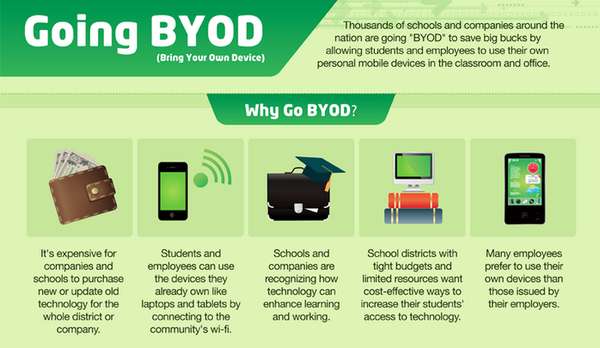
The Going BYOD Chart Looks at the Pros and Cons of Technology
Cody Turner — August 19, 2012 — Social Good
References: onlinecolleges.net
Many companies and schools are implementing a Bring Your Own Device (BYOD) approach to doing business and to learning, and the 'Going BYOD' Infographic takes a look at the advantages and disadvantages of this.
Going BYOD is the basic idea of allowing students and employees the option to use their own personal electronic devices in the office or in the classroom. Thus allowing companies and school systems the opportunity to cut back on expenses, while remaining current. This BYOD infographic outlines the many statistics from a recent study that was done, such as 85% of students and adults already own their own smartphone devices needed for BYOD.
Implementing this approach would allow students and employees to remain engaged and cut back on them forgetting devices. On the other hand, not everyone can afford these expensive electronics, and getting each and everyone’s device to work together could be difficult.
Going BYOD is the basic idea of allowing students and employees the option to use their own personal electronic devices in the office or in the classroom. Thus allowing companies and school systems the opportunity to cut back on expenses, while remaining current. This BYOD infographic outlines the many statistics from a recent study that was done, such as 85% of students and adults already own their own smartphone devices needed for BYOD.
Implementing this approach would allow students and employees to remain engaged and cut back on them forgetting devices. On the other hand, not everyone can afford these expensive electronics, and getting each and everyone’s device to work together could be difficult.
Trend Themes
1. BYOD Implementation - Implementing BYOD allows companies and schools to cut expenses while staying current with technology.
2. Engagement and Productivity - BYOD implementation enables students and employees to stay engaged and reduces the risk of forgetting devices.
3. Affordability and Compatibility - The challenge of affordable electronics and device compatibility could be disruptive to widespread BYOD adoption.
Industry Implications
1. Education - The education industry can benefit from BYOD implementation to enhance learning experiences and reduce costs.
2. Technology - The technology industry has the opportunity to develop affordable BYOD devices and solutions that ensure compatibility.
3. Telecommunications - Telecommunications companies can capitalize on the increased demand for connectivity and data plans resulting from widespread BYOD usage.
4.5
Score
Popularity
Activity
Freshness























